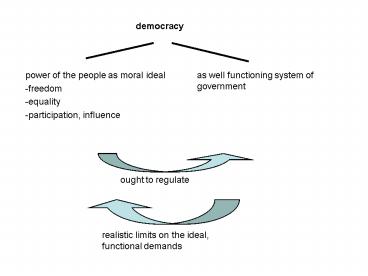democracy PowerPoint PPT Presentation
1 / 17
Title: democracy
1
democracy
- power of the people as moral ideal
- freedom
- equality
- participation, influence
as well functioning system of government
ought to regulate
realistic limits on the ideal, functional demands
2
- task avoiding the risky implications contained
in the idea of democracy - anarchic rule of the people (rule of the masses,
not reason) - random expressions of will (continuous change,
neither a systematic and nor a long-term
politics) - interests on the majority (vs. the common good)
- - factionalism (struggle between factions vs.
unity)
3
solution to build institutions that increase the
possibility to realize the goods while avoiding
the risky/bad implications Robert Dahl
(Democracy and Its Critics, 1989) second
transformation from city-state to nation-state
4
- democratic demands of
- anchoring politics in what is good for the
people, the common good (instead of the interests
of the ruling layer of society) - - equality, in an increasingly wider sense
(instead of natural privileges)
first republican conception later
representative democracy
non-democratic principle of electoral
representation - an elite as representative of
the electorate
5
competitive elitism or aggregative
democracy Joseph Schumpeter (1883-1950)
democracy is a system for the selection of the
most suitable rulers - elections, including the
pre-selection of candidates - a party system
that pre-selects suitable candidates - the party
system transforms unreflected interest positions
into a reflected position - the combination of
elections and political parties sees to it that
suitable rulers are chosen - party pluralism
guarantees that the whole population can be
covered by the system - parliamentary system of
government and opposition secures open debate on
the common good
6
- Max Weber (1864-1920),
- Weber influential on Schumpeter, some similar
ideas to those of Schumpeter - broader sociological diagnosis
- - democracys anchoring of power in the people
constantly challenged by non-democratic powers - capitalist market economy, the administrative
system (bureaucracy) - party system and parliamentarism intended to
safeguard the presence of a power of the people
as counter-power to the market economy and
administrative power - politics as vocation vs. the professional
politician
7
Robert Dahl (b. 1915)
8
Robert Dahl (b. 1915)
system polyarchy or pluralism
- democratic principles
- effective participation, citizens opportunity
for expressing preferences - voting equality at decisive stages of collective
decisions - opportunities for enlightened understanding
- the people ought to have opportunities to control
of the agenda - - inclusion
9
- the institutions of polyarchy (Dahl)
- elected officials
- free and fair elections
- inclusive suffrage
- right to run for office
- freedom of expression
- alternative information
- associational autonomy
- the institutions of polyarchy are necessary to
democracy on a large scale, particularly the
scale of the modern national state Democracy and
Its Critics, p. 221-22
10
deliberative democracy Jürgen Habermas (b. 1929),
Seyla Benhabib (b. 1950)
11
deliberative democracy anchors democracy (the
democratic moment) in the communicative processes
of the people Habermas communicative
rationality is an existing but underdeveloped
normative potential in contemporary society gt
it exists gt may be developed communicative
rationality a form of reason and reasoning
oriented towards mutual understanding (agreement,
consensus?)
12
deliberative democracy and institutions
democracy as anchored in a moral ideal
taking the need for institutions and
constitutional demands for granted to safeguard
the political process
pinpoints the core of democratic processes within
a larger institutional system
13
democracy as procedure rather than a substantial
ideal inclusion of the people within
will-formation democratic will-formation compar
e Rousseau on the general will
- Rousseau something to be found out
- virtuous citizens
- wise legislator
Habermas constructed through processes of
deliberation open process
14
deliberative democracy communicative procedures
which draw their legitimacy as the core
structure in a separate, constitutionally
organised political system, but not as a model
for all social institutions Between Facts and
Norms, p. 305
15
Habermas, the principle of discourse ethics Only
those action norms are valid to which all
possibly affected persons could agree as
participants in rational discourse ...
rational discourse should include any attempt
to reach an understanding over problematic
validity claims insofar as this takes place under
conditions of communication that enable the free
processing of topics and contributions,
information and reasons in the public space
... Between Facts and Norms (1996, orig. 1992)
p. 107-108
16
- deliberative processes (Habermas)
- moral demands
- processes of deliberation take place in
argumentative form - deliberations are inclusive and public
- deliberations are free of external coercion
- deliberations are free of internal coercions that
could detract from the equality of the
participants - political aspects
- 5. deliberations aim at rationally motivated
agreement - 6. extend to any matter that can be regulated in
the equal interest of all - 7. include the interpretations of needs and wants
17
- a layered, multidimensional process (compare
Benhabib) - communication oriented towards agreement on the
topic in question - (politics is decision oriented)
- questioning of the topic itself, its relevance
and definition - (what is the issue, which issues is relevant,
etc.) - reflexive questioning about the rules of
communication in the particular situation in
question - (who shall be included, which norms of
communication are valid, ideological background,
etc.

